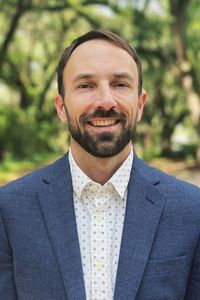Hunter Schimpff
Elections and appointments
Education
Contact
Hunter Schimpff ran for election to the Charleston County School District school board to represent West Ashley District in South Carolina. He lost in the general election on November 3, 2020.
Schimpff completed Ballotpedia's Candidate Connection survey in 2020. Click here to read the survey answers.
Biography
Hunter Schimpff obtained a bachelor's degree from Wake Forest University and a master's degree from Vanderbilt University.[1]
Elections
2020
See also: Charleston County School District, South Carolina, elections (2020)
General election
2020
Ballotpedia survey responses
See also: Ballotpedia's Candidate Connection
Hunter Schimpff completed Ballotpedia's Candidate Connection survey in 2020. The survey questions appear in bold and are followed by Schimpff's responses.
Expand all | Collapse all
Hunter Schimpff is a former teacher and educator that has served in various K-12 education policy, finance, and operations roles for more than a decade. Hunter is a graduate of K-12 public schools and has a daughter that attends a Charleston County public school. Schimpff has served as a high school math teacher, as a K-12 public school district administrator in South Carolina, and has a Master's degree in Education Policy from Vanderbilt University.
- Former teacher. Public School parent. Advocate for transparency and accountability.
- We need to push more resources to our schools and classrooms and reduce the stifling CCSD central office bureaucracy.
- We must focus on high-quality early childhood education opportunities and early literacy skills for all our students, especially our most vulnerable students.
I believe every child in Charleston should have access to a high-quality public school. To get there, I believe we should be investing in our community neighborhood schools and strategically investing in public choice options to provide excellent and equitable schools for all families.
Students will always be at the front and center of every decision I make. If elected to the Charleston school board, my decisions and my votes will be for the best interests of students, 100% of the time.
I have great respect for educators - our teachers and leaders - who strive to positively impact students and student well-being on a daily basis. Teachers work hard and long hours and have great impacts on our students and their futures.
I can't think of any one example. I try to seek out multiple sources of information, including academic studies and if I have any specific philosophy around making policy decisions, it's that I seek to be data-driven and informed by clear facts and best educational practices.
Listening to and regularly communicating with constituents.
Be focused on the best interests of students, 100% of the time.
Hire and then hold a superintendent accountable for proper management of the district and increases in student outcomes. Manage and balance the district's budget and steward taxpayer funds appropriately.
All Charleston students, families, and educators.
The annual budget process affords an opportunity to ensure that we're focusing on student outcomes and raising student achievement while also addressing the diverse needs of the district's constituents.
It's important to connect with multiple groups in the community and listen regularly to the concerns, issues, and celebrations of our students and educators. I have multiple open lines of communication - constituents can reach me via email, social media, and other
I would seek to be well connected with the PTO of every CCSD school so that I have a direct connection with parent groups at the district's schools.
Yes. We need better data for accountability purposes on our overall staffing levels and we need to be more intentional about recruiting qualified teachers and leaders from the Charleston community to serve in the district.
There are many issues, including the associated effects of poverty that rest outside of what a school district can control. For what's in a school district's control, the system is overly bureaucratic to the point that it stifles effective learning in classrooms and schools. My strategy as a board member would be to decentralize the power and budgetary resources of the central office and start giving more autonomy to school leaders and teachers and ensure that there are proper accountability safeguards in place.
There are numerous aspects that go into good teaching, including the ability to manage a classroom, meet student's basic needs, have solid content knowledge, effective communication, and delivery skills.
Our curriculum resources need to become more rigorous and higher quality. I'm very supportive of the academic research and science behind effective reading practices, and we need to ensure that curriculum resources are aligned to the most effective known practices for literacy instruction and are developmentally appropriate materials. We also need to focus much more on a curriculum that reflects entrepreneurship opportunities and opportunities to learn critical real-world skills in our middle and high schools
We need to bring more transparency and accountability to the school district's budget to help ensure that we're eliminating wasteful spending that is not going towards students and educators. It's also important to balance the budget on an annual basis and ensure that the district can properly maintain a capital building and maintenance program that is properly, but not overly funded.
I believe that our schools would be well-served to have better training for educators and adults that examine biases and inequitable student discipline practices. I do believe that we should have a well-trained SRO in every public school to help with keeping our students and educators safe.
It's important that we are serious about increasing investment in mental health counselors, guidance counselors, and school psychologists in our annual budget process every year.
My belief is that technology sometimes overpromises what it is capable of in the field of K-12 education, especially as it relates to early literacy and early numeracy skills. Despite many of the advances in technology over the past decade with various tools and software, many of our students still struggle with basic academic skills. We have to ensure that all students are prepared with 21st-century skills, but that starts by having a very solid educational foundation that is formed in the early years.
Note: Ballotpedia reserves the right to edit Candidate Connection survey responses. Any edits made by Ballotpedia will be clearly marked with [brackets] for the public. If the candidate disagrees with an edit, he or she may request the full removal of the survey response from Ballotpedia.org. Ballotpedia does not edit or correct typographical errors unless the candidate's campaign requests it.
See also
External links
- ↑ Information submitted to Ballotpedia through the Candidate Connection survey on September 24, 2020






 = candidate completed the Ballotpedia Candidate Connection survey.
= candidate completed the Ballotpedia Candidate Connection survey.









